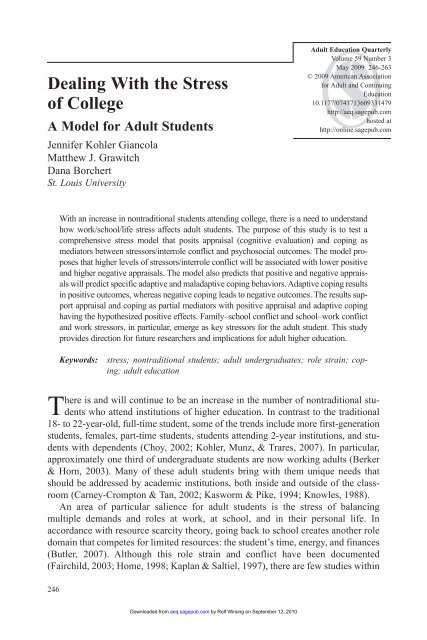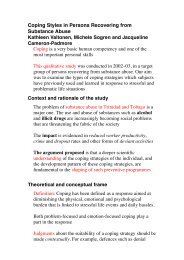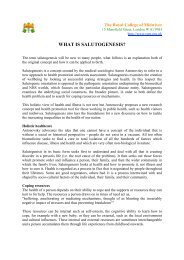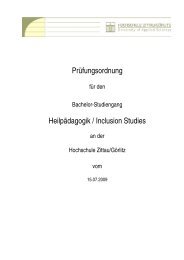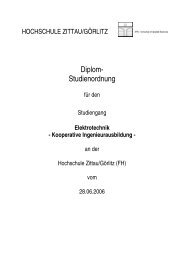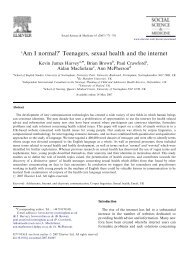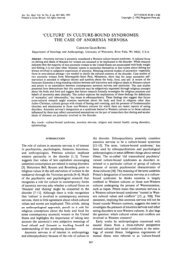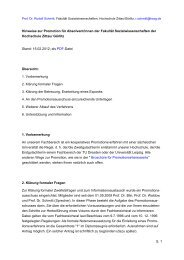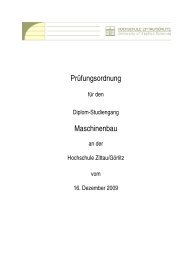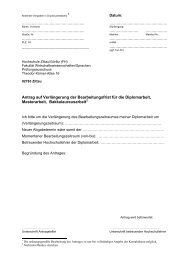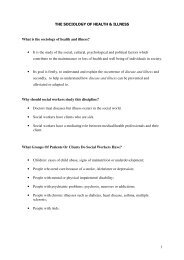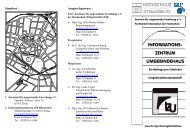Dealing With the Stress of College
Dealing With the Stress of College
Dealing With the Stress of College
You also want an ePaper? Increase the reach of your titles
YUMPU automatically turns print PDFs into web optimized ePapers that Google loves.
<strong>Dealing</strong> <strong>With</strong> <strong>the</strong> <strong>Stress</strong><br />
<strong>of</strong> <strong>College</strong><br />
A Model for Adult Students<br />
Jennifer Kohler Giancola<br />
Mat<strong>the</strong>w J. Grawitch<br />
Dana Borchert<br />
St. Louis University<br />
246<br />
Adult Education Quarterly<br />
Volume 59 Number 3<br />
May 2009 246-263<br />
© 2009 American Association<br />
for Adult and Continuing<br />
Education<br />
10.1177/0741713609331479<br />
http://aeq.sagepub.com<br />
hosted at<br />
http://online.sagepub.com<br />
<strong>With</strong> an increase in nontraditional students attending college, <strong>the</strong>re is a need to understand<br />
how work/school/life stress affects adult students. The purpose <strong>of</strong> this study is to test a<br />
comprehensive stress model that posits appraisal (cognitive evaluation) and coping as<br />
mediators between stressors/interrole conflict and psychosocial outcomes. The model proposes<br />
that higher levels <strong>of</strong> stressors/interrole conflict will be associated with lower positive<br />
and higher negative appraisals. The model also predicts that positive and negative appraisals<br />
will predict specific adaptive and maladaptive coping behaviors. Adaptive coping results<br />
in positive outcomes, whereas negative coping leads to negative outcomes. The results support<br />
appraisal and coping as partial mediators with positive appraisal and adaptive coping<br />
having <strong>the</strong> hypo<strong>the</strong>sized positive effects. Family–school conflict and school–work conflict<br />
and work stressors, in particular, emerge as key stressors for <strong>the</strong> adult student. This study<br />
provides direction for future researchers and implications for adult higher education.<br />
Keywords: stress; nontraditional students; adult undergraduates; role strain; coping;<br />
adult education<br />
There is and will continue to be an increase in <strong>the</strong> number <strong>of</strong> nontraditional students<br />
who attend institutions <strong>of</strong> higher education. In contrast to <strong>the</strong> traditional<br />
18- to 22-year-old, full-time student, some <strong>of</strong> <strong>the</strong> trends include more first-generation<br />
students, females, part-time students, students attending 2-year institutions, and students<br />
with dependents (Choy, 2002; Kohler, Munz, & Trares, 2007). In particular,<br />
approximately one third <strong>of</strong> undergraduate students are now working adults (Berker<br />
& Horn, 2003). Many <strong>of</strong> <strong>the</strong>se adult students bring with <strong>the</strong>m unique needs that<br />
should be addressed by academic institutions, both inside and outside <strong>of</strong> <strong>the</strong> classroom<br />
(Carney-Crompton & Tan, 2002; Kasworm & Pike, 1994; Knowles, 1988).<br />
An area <strong>of</strong> particular salience for adult students is <strong>the</strong> stress <strong>of</strong> balancing<br />
multiple demands and roles at work, at school, and in <strong>the</strong>ir personal life. In<br />
accordance with resource scarcity <strong>the</strong>ory, going back to school creates ano<strong>the</strong>r role<br />
domain that competes for limited resources: <strong>the</strong> student’s time, energy, and finances<br />
(Butler, 2007). Although this role strain and conflict have been documented<br />
(Fairchild, 2003; Home, 1998; Kaplan & Saltiel, 1997), <strong>the</strong>re are few studies within<br />
Downloaded from<br />
aeq.sagepub.com by Rolf Wirsing on September 12, 2010


